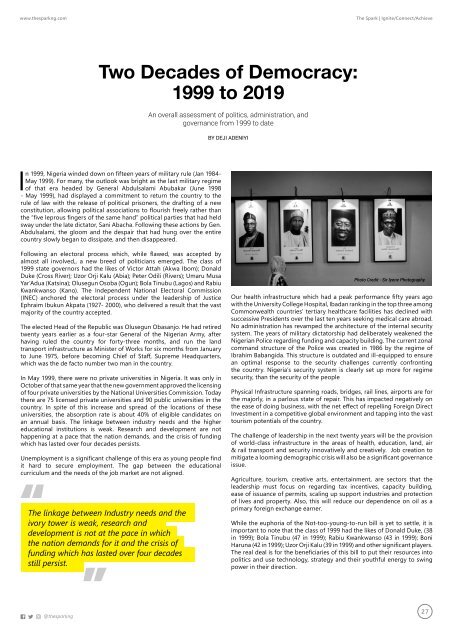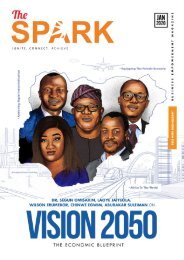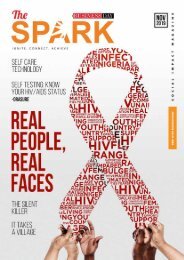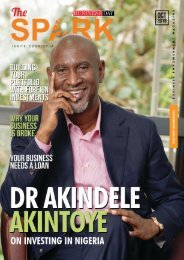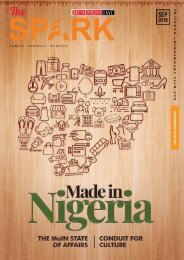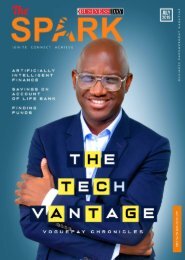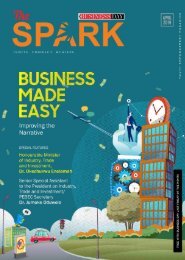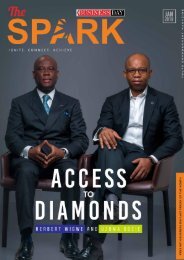Politics and Governance - More Than A Conversation
Create successful ePaper yourself
Turn your PDF publications into a flip-book with our unique Google optimized e-Paper software.
www.thesparkng.com<br />
The Spark | Ignite/Connect/Achieve<br />
Two Decades of Democracy:<br />
1999 to 2019<br />
An overall assessment of politics, administration, <strong>and</strong><br />
governance from 1999 to date<br />
BY DEJI ADENIYI<br />
In 1999, Nigeria winded down on fifteen years of military rule (Jan 1984-<br />
May 1999). For many, the outlook was bright as the last military regime<br />
of that era headed by General Abdulsalami Abubakar (June 1998<br />
- May 1999), had displayed a commitment to return the country to the<br />
rule of law with the release of political prisoners, the drafting of a new<br />
constitution, allowing political associations to flourish freely rather than<br />
the “five leprous fingers of the same h<strong>and</strong>” political parties that had held<br />
sway under the late dictator, Sani Abacha. Following these actions by Gen.<br />
Abdulsalami, the gloom <strong>and</strong> the despair that had hung over the entire<br />
country slowly began to dissipate, <strong>and</strong> then disappeared.<br />
Following an electoral process which, while flawed, was accepted by<br />
almost all involved,, a new breed of politicians emerged. The class of<br />
1999 state governors had the likes of Victor Attah (Akwa Ibom); Donald<br />
Duke (Cross River); Uzor Orji Kalu (Abia); Peter Odili (Rivers); Umaru Musa<br />
Yar’Adua (Katsina); Olusegun Osoba (Ogun); Bola Tinubu (Lagos) <strong>and</strong> Rabiu<br />
Kwankwanso (Kano). The Independent National Electoral Commission<br />
(INEC) anchored the electoral process under the leadership of Justice<br />
Ephraim Ibukun Akpata (1927- 2000), who delivered a result that the vast<br />
majority of the country accepted.<br />
The elected Head of the Republic was Olusegun Obasanjo. He had retired<br />
twenty years earlier as a four-star General of the Nigerian Army, after<br />
having ruled the country for forty-three months, <strong>and</strong> run the l<strong>and</strong><br />
transport infrastructure as Minister of Works for six months from January<br />
to June 1975, before becoming Chief of Staff, Supreme Headquarters,<br />
which was the de facto number two man in the country.<br />
In May 1999, there were no private universities in Nigeria. It was only in<br />
October of that same year that the new government approved the licensing<br />
of four private universities by the National Universities Commission. Today<br />
there are 75 licensed private universities <strong>and</strong> 90 public universities in the<br />
country. In spite of this increase <strong>and</strong> spread of the locations of these<br />
universities, the absorption rate is about 40% of eligible c<strong>and</strong>idates on<br />
an annual basis. The linkage between industry needs <strong>and</strong> the higher<br />
educational institutions is weak. Research <strong>and</strong> development are not<br />
happening at a pace that the nation dem<strong>and</strong>s, <strong>and</strong> the crisis of funding<br />
which has lasted over four decades persists.<br />
Unemployment is a significant challenge of this era as young people find<br />
it hard to secure employment. The gap between the educational<br />
curriculum <strong>and</strong> the needs of the job market are not aligned.<br />
“<br />
The linkage between Industry needs <strong>and</strong> the<br />
ivory tower is weak, research <strong>and</strong><br />
development is not at the pace in which<br />
the nation dem<strong>and</strong>s for it <strong>and</strong> the crisis of<br />
funding which has lasted over four decades<br />
still persist.<br />
“<br />
●<br />
Photo Credit - Sir Iyene Photography.<br />
Our health infrastructure which had a peak performance fifty years ago<br />
with the University College Hospital, Ibadan ranking in the top three among<br />
Commonwealth countries’ tertiary healthcare facilities has declined with<br />
successive Presidents over the last ten years seeking medical care abroad.<br />
No administration has revamped the architecture of the internal security<br />
system. The years of military dictatorship had deliberately weakened the<br />
Nigerian Police regarding funding <strong>and</strong> capacity building. The current zonal<br />
comm<strong>and</strong> structure of the Police was created in 1986 by the regime of<br />
Ibrahim Babangida. This structure is outdated <strong>and</strong> ill-equipped to ensure<br />
an optimal response to the security challenges currently confronting<br />
the country. Nigeria’s security system is clearly set up more for regime<br />
security, than the security of the people<br />
Physical Infrastructure spanning roads, bridges, rail lines, airports are for<br />
the majorly, in a parlous state of repair. This has impacted negatively on<br />
the ease of doing business, with the net effect of repelling Foreign Direct<br />
Investment in a competitive global environment <strong>and</strong> tapping into the vast<br />
tourism potentials of the country.<br />
The challenge of leadership in the next twenty years will be the provision<br />
of world-class infrastructure in the areas of health, education, l<strong>and</strong>, air<br />
& rail transport <strong>and</strong> security innovatively <strong>and</strong> creatively. Job creation to<br />
mitigate a looming demographic crisis will also be a significant governance<br />
issue.<br />
Agriculture, tourism, creative arts, entertainment, are sectors that the<br />
leadership must focus on regarding tax incentives, capacity building,<br />
ease of issuance of permits, scaling up support industries <strong>and</strong> protection<br />
of lives <strong>and</strong> property. Also, this will reduce our dependence on oil as a<br />
primary foreign exchange earner.<br />
While the euphoria of the Not-too-young-to-run bill is yet to settle, it is<br />
important to note that the class of 1999 had the likes of Donald Duke, (38<br />
in 1999); Bola Tinubu (47 in 1999); Rabiu Kwankwanso (43 in 1999); Boni<br />
Haruna (42 in 1999); Uzor Orji Kalu (39 in 1999) <strong>and</strong> other significant players.<br />
The real deal is for the beneficiaries of this bill to put their resources into<br />
politics <strong>and</strong> use technology, strategy <strong>and</strong> their youthful energy to swing<br />
power in their direction.<br />
@thesparkng<br />
27


